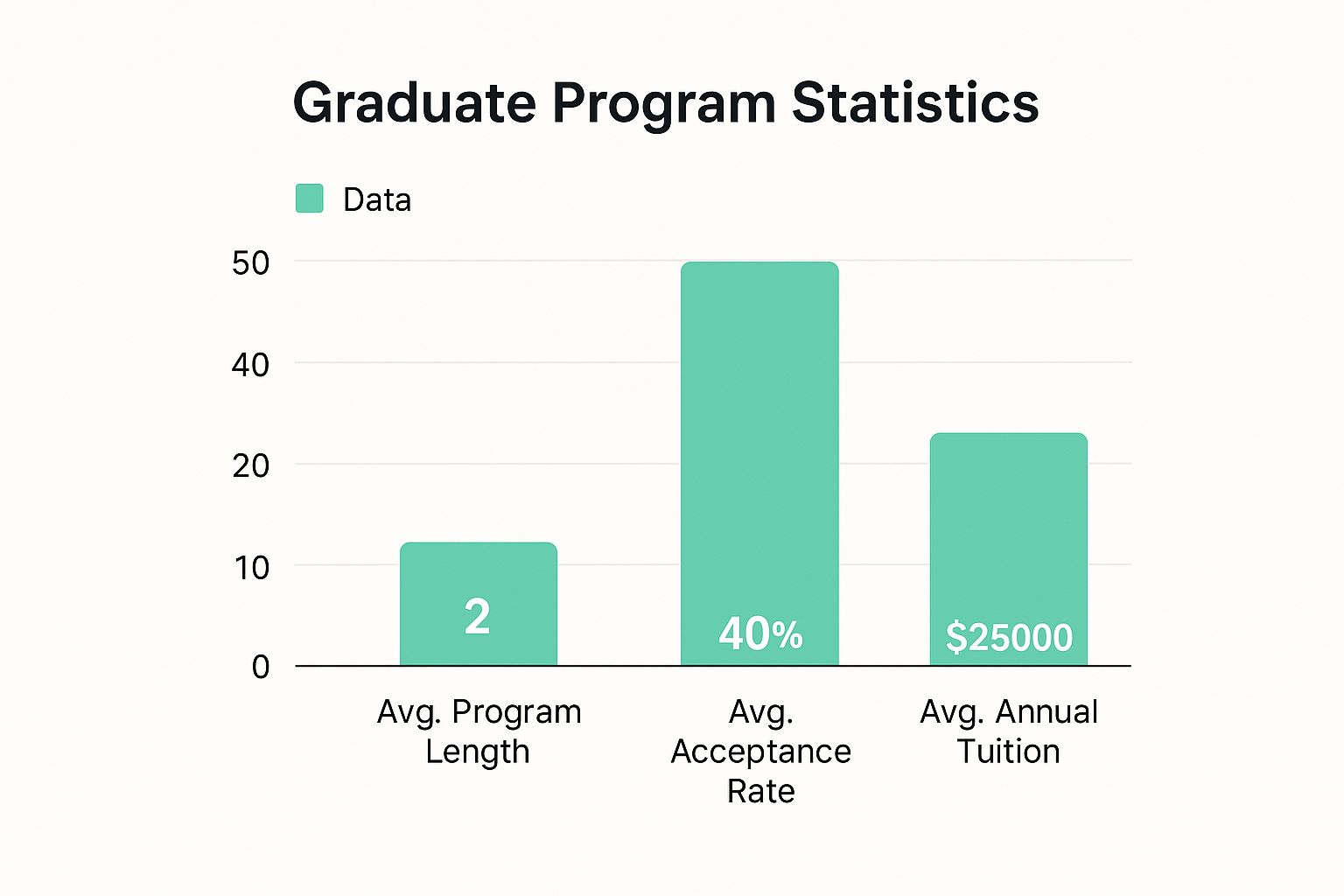
Getting ready for university is a big step, but it doesn't have to be overwhelming. Feeling anxious? You're not alone. The secret is to break the journey down into four key areas: academics, finances, housing, and your personal wellbeing. By tackling these one by one, a mountain of tasks becomes a series of simple, manageable steps.
Your Essential University Preparation Roadmap
Stepping onto campus for the first time is a massive milestone. But how do you get there without losing your mind? Think of this guide as your personal roadmap. We'll walk you through exactly how to prepare for university, ensuring you feel organised, confident, and ready for your first lecture.
The goal isn't just to get into university. It's to arrive feeling prepared, confident, and ready to dive into the experience from day one.
It’s also worth knowing that the university scene is increasingly competitive. The UK, for instance, is seeing a huge jump in global interest. Early data for the January 2025 intake shows a massive 27% increase in international student deposits compared to last year. This trend, especially with more applicants from India and Pakistan, means being well-prepared is more important than ever. You can read more about these enrolment trends on monitor.icef.com.
Understanding the University Landscape
Before you dive into the details, let's zoom out. Course lengths, entry requirements, and costs can vary wildly between universities. Getting a feel for the general landscape helps you set realistic goals right from the start.
This image gives you a snapshot of what to expect in terms of average programme length, acceptance rates, and annual tuition fees.

What do these numbers tell you? While uni is a serious investment of time and money, the acceptance rates show it's an absolutely achievable goal—if you prepare properly.
To keep you organised, we've structured this guide around four core pillars of university prep. Here’s a quick summary to help you track your progress.
Core University Preparation Pillars
| Preparation Area | Key Focus | Main Goal |
|---|---|---|
| Academic Readiness | Choosing the right course, meeting entry requirements, and doing pre-reading. | Arrive academically confident and ready to learn. |
| Logistics | Sorting out your student finance, scholarships, and securing accommodation. | Have your funding and housing sorted well before you move. |
| Practical Tasks | Creating budgets, planning your move, and knowing what to pack. | Handle all the essential "life admin" for a smooth transition. |
| Personal Wellbeing | Building support networks and preparing for the social and emotional shifts. | Develop strategies to thrive in your new independent life. |
By breaking it down like this, you can focus your energy where it’s needed most at each stage of your journey. Let’s dive into the first pillar: getting yourself academically ready.
Nailing Your Course Choice and Application

Choosing your course is one of the biggest decisions you'll make on your path to university. It’s about more than just picking a subject you enjoy; it’s about finding a path that clicks with your passions, strengths, and vision for the future.
Getting this right sets the tone for your entire university experience and even your early career. It means digging deeper than a course title to make sure the degree is a good fit, both for you as a person and for your professional goals.
Look Beyond the Prospectus
Every university prospectus is designed to sell you a dream, but you'll find the real story in the course details. Don’t just skim the summary—take a proper look at the specific modules you’ll be studying each year.
Think about how you learn best. Do you thrive under exam pressure, or do you prefer sinking your teeth into coursework and practical projects? Finding out the assessment split—whether it’s 70% coursework and 30% exams or the other way around—tells you a lot about whether a course will play to your strengths.
It’s also a great idea to check out the academics who will be teaching you. A quick search of the department’s staff page reveals their specialisms and current research. If their work sounds exciting, that’s a brilliant sign you’ll find the lectures genuinely engaging.
Align Your Choice with Career Goals
While loving your subject is crucial, it’s also smart to think about where that degree could take you. Understanding the current job market can help you make a choice that opens doors after you graduate.
Take the tech and healthcare sectors, for example. They are crying out for skilled graduates. With around 1.9 million students starting UK undergraduate courses each year, the trends for 2025 are clear. Computer Science is exploding, with 140,000 applicants—a 12% increase from 2023—driven by huge developments in AI and cybersecurity. Likewise, courses like Medicine and Nursing remain incredibly popular because they lead to vital, in-demand careers.
This doesn't mean you must pick a purely vocational subject. It’s more about understanding how your chosen field can be applied. A history degree, for instance, builds fantastic research and analytical skills that are highly valued in fields like law, journalism, and policy-making. The trick is to connect your interests to real-world opportunities.
Choosing a course is a balance between following your heart and using your head. The sweet spot is where your genuine passion meets a clear potential for your future.
Understand the Competitive Landscape
Once you have a shortlist of courses, it's time to be realistic about your application. Every course has its own entry requirements and level of competition.
Here’s what you should do:
- Check the Entry Requirements: First things first, look at the typical A-level grades or UCAS points needed. Are your predicted grades in the right ballpark?
- Tailor Your Personal Statement: Don’t send the same generic statement everywhere. Customise it for each application, highlighting experiences and skills that directly relate to that specific course and university.
- Explore Alternative Pathways: If you don't have standard A-levels, don't write yourself off. Many universities welcome other qualifications. Our guide on how to get into university without A-levels can show you the options available.
By doing your homework and understanding what admissions tutors want, you turn a hopeful application into a truly compelling one. This is what sets you up for success.
Laying the Academic Foundations Before You Arrive
Showing up to university academically prepared is about more than just having the right A-Level results. To truly hit the ground running, you need to be ready to engage with new ideas and a different style of learning from your very first lecture. It’s all about building the mental toolkit you’ll need to thrive.
The biggest shift? You’re moving from the structured world of school, where teachers guide you every step of the way, to an environment that demands independent thought. This means taking real ownership of your learning, perhaps for the first time.
Get a Head Start on Your Course Content
One of the best things you can do to ease the transition is to get familiar with your subject before you even set foot on campus. Most departments will send out a reading list over the summer. Just tackling one or two core texts can make a world of difference.
You don’t need to memorise every page. The aim is to get a feel for the main arguments and key ideas in a couple of foundational books. This gives you a solid framework to build on when new concepts are thrown at you in the first term.
Some courses also have a heavy practical element. If you're heading into a degree in design, engineering, or data science, find out what software you’ll be using. Many companies offer free trials or student versions, so you can start getting comfortable with the tools before the pressure is on.
The goal isn't to become an expert overnight. It's about building a familiarity with the language, key thinkers, and tools of your new discipline, which will boost your confidence immensely.
As you start exploring, you might want to double-check that your chosen path truly fits your long-term goals. If you have any doubts, our guide on how to know which course is right for you offers some great advice. This bit of reflection ensures you’re not just prepared, but genuinely excited about what you’re about to study.
Master the Art of Independent Study
The leap to independent learning is often the biggest academic shock for new students. Your university timetable will have far fewer contact hours than you're used to. The expectation is that you’ll fill that time with self-directed study.
To do this well, you’ll need to master a few new skills, and fast:
- Time Management: You’re in charge now. It's up to you to balance lectures, seminar prep, library time, and actually having a life.
- Critical Thinking: University isn't about simply remembering facts; it's about questioning them. You'll be expected to analyse different viewpoints, weigh evidence, and form your own well-reasoned opinions.
- Effective Note-Taking: The way you took notes in school probably won’t work in a fast-paced, hour-long lecture. You need a system to capture big ideas quickly and organise them so they make sense later.
Learning how to study smarter, not harder is a game-changer. Adopting better learning strategies will help you stay on top of your workload without feeling completely swamped—a skill that will serve you for your entire degree and beyond.
Organise Your Study Materials Before Day One
A little organisation before you arrive can save a massive amount of stress during those first hectic weeks. Instead of turning up with a single empty notebook, think about how you will manage your notes and resources for each module.
Setting up a simple system—whether physical or digital—is a lifesaver.
For a physical setup, you could try:
- Binders or Folders: Grab a separate one for each module to keep lecture notes, handouts, and reading summaries all in one place.
- Highlighters and Pens: Using different colours for key themes, definitions, or questions can make your notes much easier to scan during revision.
If you prefer a digital approach:
- Cloud Storage: Set up folders for each module in Google Drive, OneDrive, or Dropbox right away.
- Note-Taking Apps: Tools like Notion, Evernote, or OneNote are brilliant for keeping typed notes, web articles, and PDFs organised and searchable.
Getting your system sorted before term starts means you can focus your energy on learning from day one. It's a small task that makes a huge difference when the work starts piling up.
Sorting Your Student Finances and Housing

Let’s be honest: nothing kills the excitement of heading to university faster than money worries or housing stress. Sorting these two essentials early is one of the smartest moves you can make. It’s all about building a solid foundation so you can focus on your studies and enjoy student life, rather than constantly worrying about rent or your bank balance.
Tackling student finance applications and accommodation contracts can feel daunting. Think of this section as your practical guide to getting it all done. We'll break down everything from applying for loans to finding a place to live, giving you clear, actionable steps to feel in control.
Mastering Your Money from Day One
Your relationship with money is about to change, big time. For many of you, this will be the first time you're responsible for a large sum of cash that has to last for months. Getting a handle on it from the start is absolutely crucial.
The first step for most UK students is applying for student finance. This process covers your tuition fees and provides a maintenance loan for living costs. The most important thing here? Apply early. The deadlines are strict. Leave it to the last minute and you could face serious delays in getting your money—a stressful way to start your first term.
Once your funding is confirmed, it's time to make a budget. This isn't about being restrictive; it's about knowing where your money is going so you can make smarter choices. Start by listing your guaranteed income (your loan, any family help, wages from a part-time job) and then your fixed costs like rent.
A budget isn't a financial straitjacket. It's simply a plan that puts you in control, helping you direct your money where it needs to go instead of wondering where it all went.
After you've covered the essentials, you can work out what's left for socialising, hobbies, and maybe even a bit of savings. The key is to be realistic. Your budget needs to reflect how you actually live, not how you think you should live.
Spotting the Hidden Costs of Student Life
One of the biggest financial shocks for new students is all the extra costs that uni life throws at you. That maintenance loan might look like a fortune when it first lands in your account, but it can vanish surprisingly quickly if you haven't planned for everything.
Here are some common expenses that often catch students out:
- Course Materials: It's not just about textbooks. You might need to pay for specialist software, lab equipment, art supplies, or printing credits.
- Utility Bills: If you're in private housing, you'll need to budget for gas, electricity, water, and broadband on top of your rent.
- TV Licence: Planning to watch live TV on any channel or use BBC iPlayer on any device? You legally need a TV licence.
- Travel Costs: Whether it's a bus pass for your daily commute to campus or train tickets to go home, these journeys add up.
- Societies and Socials: Joining clubs is a fantastic part of the uni experience, but membership fees, team kits, and social events all have a price tag.
Factoring these into your budget from day one will save you a lot of grief later on. It’s also a great idea to open a dedicated student bank account—many come with an interest-free overdraft which can be a brilliant safety net for unexpected costs.
The Search for Your Student Home
Finding the right place to live is just as vital as getting your finances in order. Your room will be your home base, your study sanctuary, and the backdrop for some of your best memories. Your two main options are usually university-managed halls of residence or renting privately.
Halls are the classic choice for first-years, and for good reason. They are an amazing way to meet people right away, and bills are normally included in the rent, which makes budgeting simpler. When you get your offer from the university, you’ll also get information on how to apply for halls—don't sleep on that deadline.
Renting privately gives you more independence but also comes with more responsibility. You'll be dealing with landlords or letting agents, signing tenancy agreements, and probably managing your own utility bills.
Here’s a quick rundown to help you weigh your options:
| Feature | University Halls | Private Renting |
|---|---|---|
| Social Life | Fantastic for meeting new people, especially in your first year. | Can be quieter. Great if you already have a group of people to live with. |
| Convenience | Usually on or very close to campus. Bills are often included in one payment. | Locations vary. You're responsible for setting up and paying all the bills. |
| Contracts | Typically for the academic year (around 40 weeks). | Often a full 12-month contract, so you pay for the summer months too. |
| Support | On-site support from university staff and residential advisors. | You're on your own to sort any issues directly with your landlord. |
Whether you choose halls or a shared house, never sign a contract without seeing the property first. When you visit, check for damp, make sure the appliances work, and try to have a quick chat with the current tenants about the landlord and the area. A little due diligence goes a long way in ensuring you have a safe and happy home for the year.
Preparing for Student Life and Personal Wellbeing

While sorting your academics and finances is a huge part of university prep, the experience is just as much about personal growth as it is about earning a degree. Getting ready for uni means learning to look after yourself. This is your time to build resilience, make lifelong friends, and figure out who you are beyond your textbooks.
Success at university isn’t just measured by your grades. It’s about striking a healthy balance between your studies, social life, and your own mental wellbeing. Let's dive into the practical side of student life—from making friends to mastering basic life skills and knowing where to go for help when you need it.
Building Your Support System
For many people, university is the first real taste of living away from home. Feeling a mix of excitement and terror is completely normal! Building a solid support system from the get-go can make all the difference in helping you settle in and feel like you belong.
Your first community will likely be your flatmates. Making a real effort in those first few chaotic days can set the stage for brilliant friendships. Simple things work wonders: suggest a group trip to the campus shop, organise a movie night, or just be the person who offers someone a cup of tea. It all helps to break the ice.
Your support network won't just appear overnight. It's built through small, consistent efforts—joining a club, chatting to the person next to you in a lecture, or grabbing a coffee with a flatmate. These connections are your safety net.
Freshers' Week is designed for this. It's a whirlwind of taster sessions for all sorts of clubs and societies. My advice? Be open-minded, but don't feel you have to sign up for everything. Pick a few societies that genuinely spark your interest, whether that’s a sports team, a subject-specific group, or something totally different like a debating society or film club. These groups offer a ready-made community of like-minded people.
Mastering Essential Life Skills
There's nothing like the confidence that comes from knowing you can handle things on your own. If you’ve never really managed your own meals or tackled a laundry basket, now is the perfect time to learn. Trust me, these aren’t just chores; they’re fundamental to your wellbeing and will seriously reduce your stress.
Start with a few simple, budget-friendly meals. You don't need to become a gourmet chef overnight. Just learning to cook five reliable dishes (think pasta bake, chilli, stir-fry, omelettes, and soup) will keep you well-fed and save you a fortune on takeaways.
Here are a few other life skills to get a handle on before you go:
- Basic Laundry: Figure out what the little symbols on clothes tags mean and get into the habit of separating colours from whites. This small bit of knowledge can save you from the classic mistake of turning everything you own a dull shade of pink.
- Simple Cleaning: Knowing how to clean a bathroom and kitchen is non-negotiable. Living in a clean space does wonders for your mental state and helps keep the peace with your flatmates.
- Time Management: Get a digital calendar or a physical planner and start blocking out your lectures, study time, social plans, and even chores. Seeing your week laid out visually is a game-changer for feeling in control.
Picking up these skills isn't just about being practical. It builds a quiet confidence, proving to yourself that you’ve got this whole independent living thing down.
Looking After Your Mental Health
University is an incredible journey, but it has its challenges. You’ll be dealing with academic pressure, new social situations, and the emotional rollercoaster that comes with being away from home. It’s absolutely vital to put your mental health first, right from day one.
Homesickness is incredibly common, especially during the first term. Acknowledge that it's okay to miss home. The trick is to balance that by immersing yourself in your new life. Keep busy, talk to your new friends about how you're feeling—chances are they feel the same—and schedule regular calls home.
Universities have fantastic support services, and it’s smart to find out where they are before you need them. Most will have:
- Student Wellbeing Services: For confidential counselling and mental health support.
- Academic Advisors: Your go-to people when you feel overwhelmed by your course.
- The Students' Union: A hub for advice on almost everything, from housing to finance.
Remember, asking for help is a sign of strength, not weakness. Proactively looking after your emotional wellbeing is one of the most important skills you can develop at university—one that will serve you long after graduation. In fact, many professional roles rely on a strong sense of personal development. You can even learn more about the skills needed in early years care, where empathy and support are key. Preparing for university life is your first step in building these invaluable personal qualities.
Your Top University Prep Questions, Answered
Even the most organised student has those last-minute worries before heading off to university. It’s completely normal! We’ve pulled together some of the most common questions we hear, with straightforward answers to put your mind at ease.
What Are the Biggest Mistakes to Avoid When Preparing for University?
It's surprisingly easy to stumble at the first hurdle. One of the most common mistakes is putting off your student finance application. Those deadlines are strict, and missing them could mean starting your first term with no money—a recipe for major stress.
Another classic pitfall is underestimating day-to-day living costs. That first maintenance loan payment can feel like a fortune, but it vanishes fast once you factor in food, travel, books, and a social life. It's also vital to look beyond the course title and dig into the specific modules you’ll be studying. What you think a course is about might not match the reality.
Honestly, the biggest mistake is simply not planning. A few hours spent sorting your budget, researching your course modules, and knowing who to contact for support will save you weeks of headaches later on.
Finally, don't be that person who brings their entire bedroom to halls. Pack the essentials first; you can always buy extra bits and pieces when you get there. Also, try to connect with clubs, societies, and university support services early on. Waiting too long can make those first few weeks feel pretty lonely.
How Can I Prepare for University as an International Student?
Coming to study in the UK from abroad involves a few extra, but crucial, steps. Your number one priority has to be your visa application. Get it done as early as you possibly can, because the process can take a while and you don’t want that last-minute panic.
Next up, sort out your accommodation. This should be high on your list, as housing in popular university cities gets snapped up quickly. When you arrive, one of the first things you should do is register with a local doctor (a GP) so you can access the UK's National Health Service (NHS).
Here are a few other essential things to get sorted:
- Open a UK Bank Account: This will make managing your money so much simpler and cheaper than constantly dealing with international transaction fees.
- Get to Know UK Culture: Small things can feel different, from the way people queue to pub etiquette. A bit of reading up beforehand can help you settle in faster.
- Connect Before You Fly: Nearly every university has an International Student Society. Look them up on social media and say hello! They offer brilliant, practical advice and a ready-made community of people who know exactly what you’re going through.
What Life Skills Should I Learn Before Going to University?
Trust us on this one: mastering a few basic life skills before you leave home will make the jump to independent living much smoother. This isn't just about chores; it's about feeling confident and self-sufficient.
If you learn only one thing, make it cooking. You don't need to become a gourmet chef, but knowing how to cook five simple, healthy, and cheap meals will save you a fortune and keep you from living on takeaways. Think pasta bakes, a basic curry, or a hearty soup.
Beyond the kitchen, try to get a handle on these essentials:
- Budgeting: Get used to tracking what you spend each week. A simple app or spreadsheet is all you need to see where your money is actually going.
- Time Management: Learn to use a calendar to juggle your lectures, study time, social life, and maybe even a part-time job.
- Basic Cleaning: You really need to know how to keep a kitchen and bathroom hygienic. This is non-negotiable for happy flat-sharing!
- Laundry: Figuring out washing machine settings and what the symbols on your clothes mean will prevent at least one pink-hued disaster.
Should I Get a Part-Time Job in My First Year?
This is a personal one, and the right answer depends entirely on your financial needs and how demanding your course is. A part-time job can be fantastic for extra cash and gaining some real-world experience.
That said, many students find it helpful to wait until at least the second term before looking for work. Your first term is a huge period of adjustment, both academically and socially. It's often best to give yourself that time to settle in and find your feet without the extra pressure of a job.
If you do decide to work, try looking for flexible jobs right on campus. Roles in the student union bar, the library, or as a student ambassador are often ideal because the employers understand that your studies come first. Always remember, your degree is the priority—if you see your grades start to slip, it might be a sign to cut back on your hours.
At Stonebridge Associated Colleges, we believe everyone deserves the chance to pursue their educational goals. Our flexible, 100% online Access to Higher Education Diplomas are designed to fit around your life, providing a clear and supported pathway to university, no matter your starting point.
Ready to take the next step on your academic journey? Explore our courses and find out how we can help you get there.




